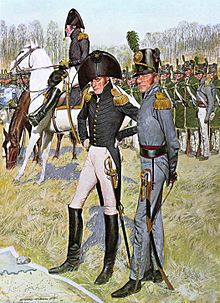| Regiment of Riflemen | |
|---|---|
 Riflemen officer in gray (foreground) and troops in green smocks (background) | |
| Active | 1808–1821 |
| Disbanded | March 2, 1821 |
| Country | |
| Branch | |
| Type | Riflemen |
| Role | Light infantry |
| Size | Regiment |
| Posts | New Orleans, Territory of Louisiana Washington, Mississippi Territory Fort Atkinson, Louisiana Purchase |
| Weapons | Harpers Ferry Model 1803 U.S. Model 1814 scalping knife tomahawk, |
| Engagements | Tecumseh's War |
| Campaigns | Battle of Tippecanoe War of 1812 |
| Commanders | |
| Commanders | Alexander Smyth (1808–1812) Thomas Adams Smith (1812–1814, 1815–1818) George Washington Sevier(1814–1815) Talbot Chambers (1818–1821) |
| Key Subordinate Commanders | Benjamin Forsyth Daniel Appling Lodowick Morgan |
| Insignia | |
| Cap insignia authorized in 1817 |  |
The Regiment of Riflemen was a unit of the U.S. Army in the early nineteenth century. Unlike the regular US line infantry units with muskets and bright blue and white uniforms, this regiment was focused on specialist light infantry tactics, and were accordingly issued rifles and dark green and black uniforms to take better advantage of cover. This was the first U.S. rifleman formation since the end of the American Revolutionary War 25 years earlier.[1]
Where can you find troops more efficient than Morgan's riflemen of the Revolution or Forsyth's riflemen of the last war with Great Britain?
— Major Bennet Riley, U.S. Army, Letter to Lewis F. Linn
The regiment was first activated in 1808. During the War of 1812, it was temporarily designated as the 1st Regiment of Riflemen when the War Department created three additional similar regiments. The regiment never fought as a unit. Companies, detachment from companies or collections of companies were stationed at a distance from each other and were often allocated to other commands. After the War, the other three regiments were inactivated and the regiment reverted to its unnumbered designation. The regiment was inactivated in June 1821.
- ^ John C. Fredriksen: The United States Army: A Chronology, 1775 to the Present. ABC-CLIO, 2010, p. 63.